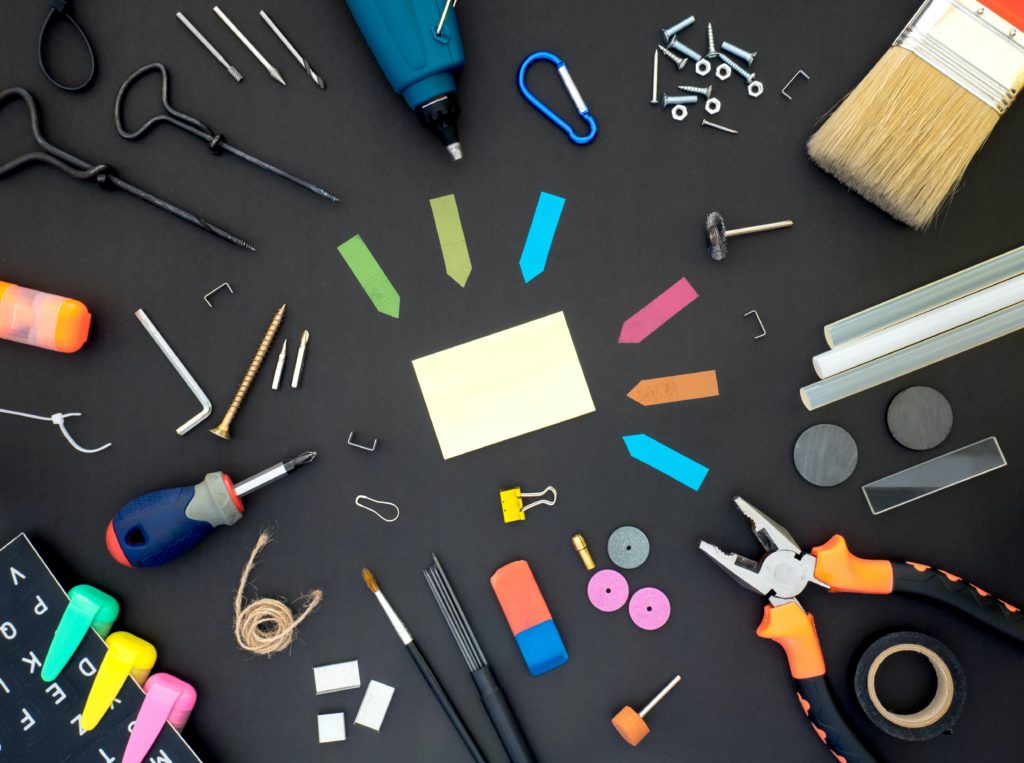Thinkin’ Bout: Being a Tool
September 2, 2020

Being a middle schooler/high schooler in the early 2000’s meant calling people “tools.” A lot. I think the root idea was that a “tool” was someone who was fake, phony, or plastic. Someone that was just being “utilized” by society or popular trends. Honestly, I don’t think we really knew what we meant by it, but one thing was clear: you didn’t want to be a tool.
But I’m here to say you should be a tool. Shockingly, I was wrong in high school!
As actors (and voice actors especially) we should see ourselves as tools. Here are some reasons why:
1. Your Own Mental Health
In his interview on episode 9 of the podcast Dead Eyes, Seth Rogen talks about how he handled an extensive rejection in his career by seeing himself as a tool. He was able to get over an incident where his hopes were risen to extreme heights only to be dashed because he recognized it wasn’t about him. He was a hammer; they needed a screw driver.
I get rejected all the time. I’m the wrong fit for things a lot. Sometimes, the client realizes it early, other times, they realize it late. This used to get into my head (especially acting in high school), but that’s not helpful. Would you get mad at someone if they tried one of the wrenches above, realized it was the wrong size, so they put it back and picked another one? Nope. So don’t get mad when it happens to you.
This brings me to my next point:
2. Your Clients See You as a Tool
This week, I had the chance to join a creatives meetup: Creatives Not Robots. The meeting was almost entirely comprised of animators and video producers, save one other voice talent. I realized pretty soon that I was outnumbered, and that the discussion’s focus would largely not include VO, but I stayed anyway. And I’m glad that I did.
Doing so allowed me to see how the process works before it finally needs me. I realized, quickly, that almost everything about the animation and video production process is trial and error. At one point, the room lamented the removal of an Adobe AfterEffects ping-pong feature that used to allow them to immediately compare changes made to the project. They talked about the software they use currently, and new software they’ll need to learn in the future.
In other words, their live and livelihood is learning how to select and use the right tool for the job. So when they choose us to voice their work (which they have cared for a long time up until that point), they need to know we’re right for the job. They need to make sure everything about the use of us as a tool enhances the end product. It’s no different than any other part of the process.
So allow yourself to be a digital tool, too. If a brush needs to be softer or sharper, you wouldn’t be upset that they changed the settings. If they need the “settings” of your voice change in direction, then listen, and change it. Because…
3. It’s Weird to be Precious About Tools
Some people have the tool set their grandparent passed down to them that they love and cherish. Most of us buy a hammer at Lowe’s when we need one. We aren’t precious about tools- they’re a means to an end. We don’t ask a Phillip’s head how its feeling when we use it, we just use it.
I’m not saying let your client treat you like an inanimate object, I’m just saying be less precious about the whole process. There’s a job to do. Be a flexible tool that can do lots of jobs, but don’t be too upset when you’re just not right for it.
Conclusion
So, be a tool. Help a job get done. And while you’re here, check out the Dead Eyes Podcast and Creatives Not Robots, or another creatives meetup in your area. Both have been great for me to gain some perspective in my jump to full time.
COPYRIGHT © 2022 DANNY HUGHES VOICE OVER
ALL RIGHTS RESERVED
PRIVACY POLICY
WEBSITE DESIGNED BY JELLY CREATIVE CO.
COPYRIGHT © 2022 DANNY HUGHES VOICE OVER. ALL RIGHTS RESERVED | PRIVACY POLICY | WEBSITE DESIGNED BY JELLY CREATIVE CO.
Demos
Book
About
Clients
Blog
Voice over artist based in Maryland and serving clients world wide.
Let's find the fun!